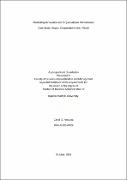| dc.contributor.author | Nassuna, Carol .S | |
| dc.date.accessioned | 2024-02-20T08:28:40Z | |
| dc.date.available | 2024-02-20T08:28:40Z | |
| dc.date.issued | 2016-10-01 | |
| dc.identifier.uri | http://dissertations.umu.ac.ug/xmlui/handle/123456789/402 | |
| dc.description | Kuka Phinehas | en_US |
| dc.description | Fr Waiswa Henry Richard | en_US |
| dc.description.abstract | The study conceptualized and studied the effect of marketing innovation on organisational performance at Bugisu Cooperative Union. Three specific objectives guided the study, that is; to examine the effect of product innovation on organisational performance of BCU, to examine the effect of branding innovation on organisational performance of BCU, and to examine the effect of creation of new markets organisational performance of BCU. The study was guided by the Agency theory of Jensen and Meckling (1976) and the stake holder theory by Freeman (1984). A descriptive case study research design was used with a mixed approach using both quantitative and qualitative data. Total population was 45 from which a sample of 40 was derived using Krejcie and Morgan, (1970) table.
Data was generated using questionnaire method, supplemented with interview. The Findings revealed that there was a significant positive effect of product innovation on organisational performance at a correlation coefficient (R) = 0.755** given by Pearson correlation. Using predictor – product innovation, R2 was 0.57. There was a significant positive effect of branding innovation on organisational performance at a correlation coefficient (R) = 0.593** given by Pearson correlation. The predictor – Branding innovation revealed R2 of 0.352. There was a significant positive effect of creation of new market on organisational performance at a correlation coefficient (R) = 0.685** given by Pearson correlation. Using predictor – creation of new markets, R2 was 0.469. There was a significant positive relationship between innovation and organisational performance at a correlation coefficient (R) = 0.749** given by Pearson correlation. The combined predictor – marketing innovation revealed R2 of 0.560.
Recommendations were: BCU management to consider engaging in final coffee processing to fetch better sales returns on the final coffee products. BCU management should embark on coffee certification for example getting a fair trade coffee certification or organic coffee certification as one way of being product innovative. The study also recommended specialised training and attachment of staff to coffee processing organisations to gain a better understanding of coffee processing and quality testing. BCU management needs to advertise using local and international media to improve on the awareness of the organisation and what it does, to boost corporate image and awakening the existence of BCU in the minds of the stake holders. The study recommended that BCU attaches prizes to innovations that are implemented by the organisation as a way to boost innovative ideas from staff. | en_US |
| dc.language.iso | en | en_US |
| dc.publisher | Uganda Martyrs University | en_US |
| dc.subject | Marketing innovation | en_US |
| dc.subject | Organisational performance | en_US |
| dc.title | Marketing innovation and organisational performance | en_US |
| dc.title.alternative | Case study: Bugisu Cooperative Union, Mbale | en_US |
| dc.type | Dissertation | en_US |


